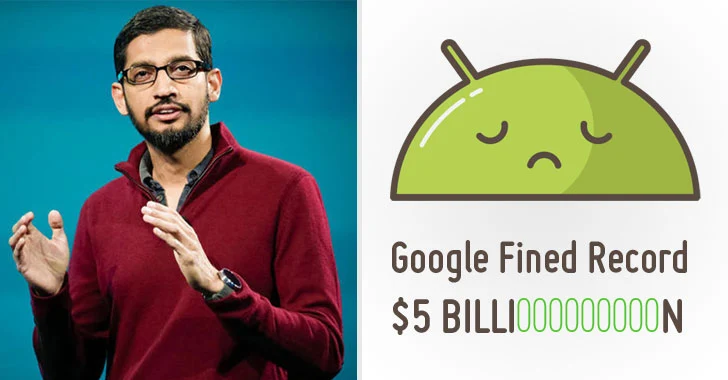Google has been hit by a record-breaking $5 billion antitrust fine by the European Union regulators for abusing the dominance of its Android mobile operating system and thwarting competitors.
That's the largest ever antitrust penalty.
Though Android is an open-source and free operating system, device manufacturers still have to obtain a license, with certain conditions, from Google to integrate its Play Store service within their smartphones.
The European Commission levied the fine Wednesday, saying that Google has broken the law by forcing Android smartphone manufacturers to pre-install its own mobile apps and services, like Google Search, Chrome, YouTube, and Gmail, as a condition for licensing.
This tactic eventually gives Google's app and services an unfair preference over other rival services, preventing rivals from innovating and competing, which is "illegal under EU antitrust rules."
Google's Android operating system runs on more than 80 percent of the smartphones worldwide, and powers more than three-quarters of Europe's smartphones, which grants the company a dominant position in the mobile market.
Here's what Google CEO Sundar Pichai have to say in response to the accusations made by the EU:
This is pretty clear and straightforward response.
He also added that "if you prefer other apps—or browsers, or search engines—to the preloaded ones, you can easily disable or delete them, and choose other apps instead, including apps made by some of the 1.6 million Europeans who make a living as app developers."
The European Union also hit Google with a separate antitrust penalty of $2.7 billion (€2.4 billion) last year over shopping-search results in Google Search, making a total of $7.85 billion (~ €6.7 billion) fine.
Google is appealing that fine and is expected to appeal the new one too, as the tech giant has repeatedly denied these accusations, arguing that smartphone manufacturers have the option to use the open-source software.
Besides Google, the European Commission also levied an antitrust fine of $1.43 million on Facebook last year, $1.4 billion on Intel in 2009, and $899 million on Microsoft in 2008.
That's the largest ever antitrust penalty.
Though Android is an open-source and free operating system, device manufacturers still have to obtain a license, with certain conditions, from Google to integrate its Play Store service within their smartphones.
The European Commission levied the fine Wednesday, saying that Google has broken the law by forcing Android smartphone manufacturers to pre-install its own mobile apps and services, like Google Search, Chrome, YouTube, and Gmail, as a condition for licensing.
This tactic eventually gives Google's app and services an unfair preference over other rival services, preventing rivals from innovating and competing, which is "illegal under EU antitrust rules."
Google's Android operating system runs on more than 80 percent of the smartphones worldwide, and powers more than three-quarters of Europe's smartphones, which grants the company a dominant position in the mobile market.
"Mobile Applications Distribution Agreement (MADA) requires handset makers to put certain Google services front and center on their devices and, crucially, to set them as default." Europe's Competition Commissioner Margrethe Vestager said.Google has been ordered to put an end to illegal conduct within 90 days, or the company will face additional penalties—up to 5 percent of Alphabet's average daily worldwide turnover.
Google CEO's Response to Android Antitrust Fine
Here's what Google CEO Sundar Pichai have to say in response to the accusations made by the EU:
In 2007, we chose to offer Android to phone makers and mobile network operators for free. Of course, there are costs involved in building Android, and Google has invested billions of dollars over the last decade to make Android what it is today.
This investment makes sense for us because we can offer phone makers the option of pre-loading a suite of popular Google apps (such as Search, Chrome, Play, Maps and Gmail), some of which generate revenue for us, and all of which help ensure the phone 'just works,' right out of the box.
Phone makers don't have to include our services, and they're also free to pre-install competing apps alongside ours. This means that we earn revenue only if our apps are installed, and if people choose to use our apps instead of the rival apps.
This is pretty clear and straightforward response.
He also added that "if you prefer other apps—or browsers, or search engines—to the preloaded ones, you can easily disable or delete them, and choose other apps instead, including apps made by some of the 1.6 million Europeans who make a living as app developers."
The European Union also hit Google with a separate antitrust penalty of $2.7 billion (€2.4 billion) last year over shopping-search results in Google Search, making a total of $7.85 billion (~ €6.7 billion) fine.
Google is appealing that fine and is expected to appeal the new one too, as the tech giant has repeatedly denied these accusations, arguing that smartphone manufacturers have the option to use the open-source software.
Besides Google, the European Commission also levied an antitrust fine of $1.43 million on Facebook last year, $1.4 billion on Intel in 2009, and $899 million on Microsoft in 2008.





















